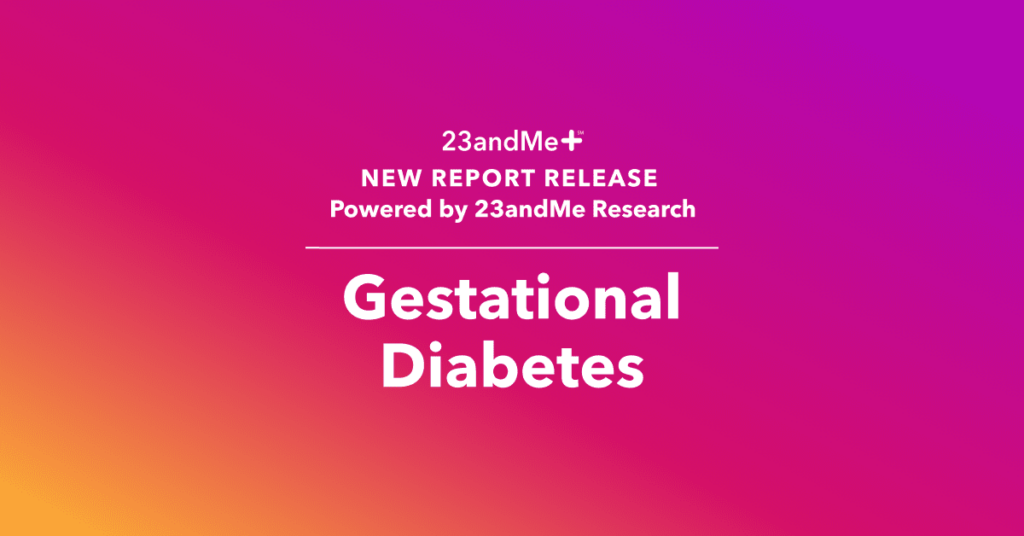A welcomed pregnancy comes with all sorts of emotions—most often joy, excitement, and maybe a little anxiety.
You can take steps before getting pregnant that can go a long way toward tamping down some of that worry and supporting your and your baby’s health through your pregnancy and beyond. Of course, learning more about your health is a great start. It’s also important to know that simple day-to-day actions like exercising and watching your diet can help set you on the right path.
 Gestational Diabetes
Gestational Diabetes
23andMe recently released a new 23andMe+ Premium report on gestational diabetes report. Powered by 23andMe research, this new report uses machine learning techniques to estimate a person’s likelihood of developing gestational diabetes. To make that estimate, we use a statistical model that looks at a person’s ethnicity and more than 6,000 genetic variants associated with developing gestational diabetes mellitus, commonly known as gestational diabetes.
Fortunately, it’s a condition that is largely preventable. While genetics plays a role, healthy lifestyle habits before pregnancy, like maintaining a healthy weight, eating a balanced diet, exercising, and not smoking, can lower your risk.
So, what is gestational diabetes?
During pregnancy, your body changes. It adapts to make more hormones, and you put on weight. In turn, your body’s cells aren’t able to use insulin, a hormone that’s instrumental in regulating your blood sugar levels, as effectively. This is known as “insulin resistance,” which is common during pregnancy. Typically, the body responds by producing more insulin. However, gestational diabetes occurs when your body can’t produce enough insulin to meet the increased need, resulting in blood sugar levels that are too high.
The Numbers
Unfortunately, gestational diabetes has become much more common as the rates of obesity have risen. The Centers for Disease Control and Prevention estimates that between 6 percent and 9 percent of those expecting will develop the condition, which is often preventable. The risk for gestational diabetes is particularly high among African Americans, Asian Americans, and people of Hispanic/Latino, Indigenous American, and Pacific Islander descent.
Gestational diabetes typically occurs without any symptoms but can have longer-term impacts on your and your baby’s health. For example, those with gestational diabetes are more likely to develop high blood pressure during pregnancy or have a larger baby that requires a cesarean section for delivery. Gestational diabetes also increases the parent and child’s chances of developing type 2 diabetes later in life.
All this adds to the importance of knowing your potential of developing gestational diabetes. Beyond genetics, there are other factors that can increase your chances. For example, having had gestational diabetes in a previous pregnancy increases the likelihood of developing it again in a subsequent pregnancy. So too does having prediabetes, polycystic ovary syndrome, or a family history of diabetes, increase one’s chances. Being overweight also adds to the likelihood. And as people get older, this condition tends to be more common. If you may become pregnant, sharing whether you have any of these factors with your health care provider is important. They may suggest testing earlier during pregnancy to know for sure if you have gestational diabetes.
Taking Action
Understanding more about your genetic and non-genetic factors that may influence your likelihood of developing gestational diabetes might be the knowledge you need to spur action. Then, you can lower your risk.
Remember to talk with your healthcare provider before making any significant lifestyle changes. That said, before pregnancy, maintaining a healthy weight, eating right, and getting plenty of exercise can go a long way toward better health in the long run.
23andMe’s new Gestational Diabetes report (Powered by 23andMe Research) is available to all 23andMe+ Premium members who report their birth sex as female. To learn more about your report, go here.
Not yet a customer? Find out more about 23andMe+ Premium here.
*Note: The 23andMe Gestational Diabetes report is based on 23andMe research and incorporates more than 6,000 genetic variants to provide information on the likelihood of developing gestational diabetes mellitus. The report does not account for lifestyle or family history and has not been reviewed by the US Food and Drug Administration. Visit www.23andme.com/topics/health-predispositions/ for additional important information on 23andMe’s Health Predisposition reports.




